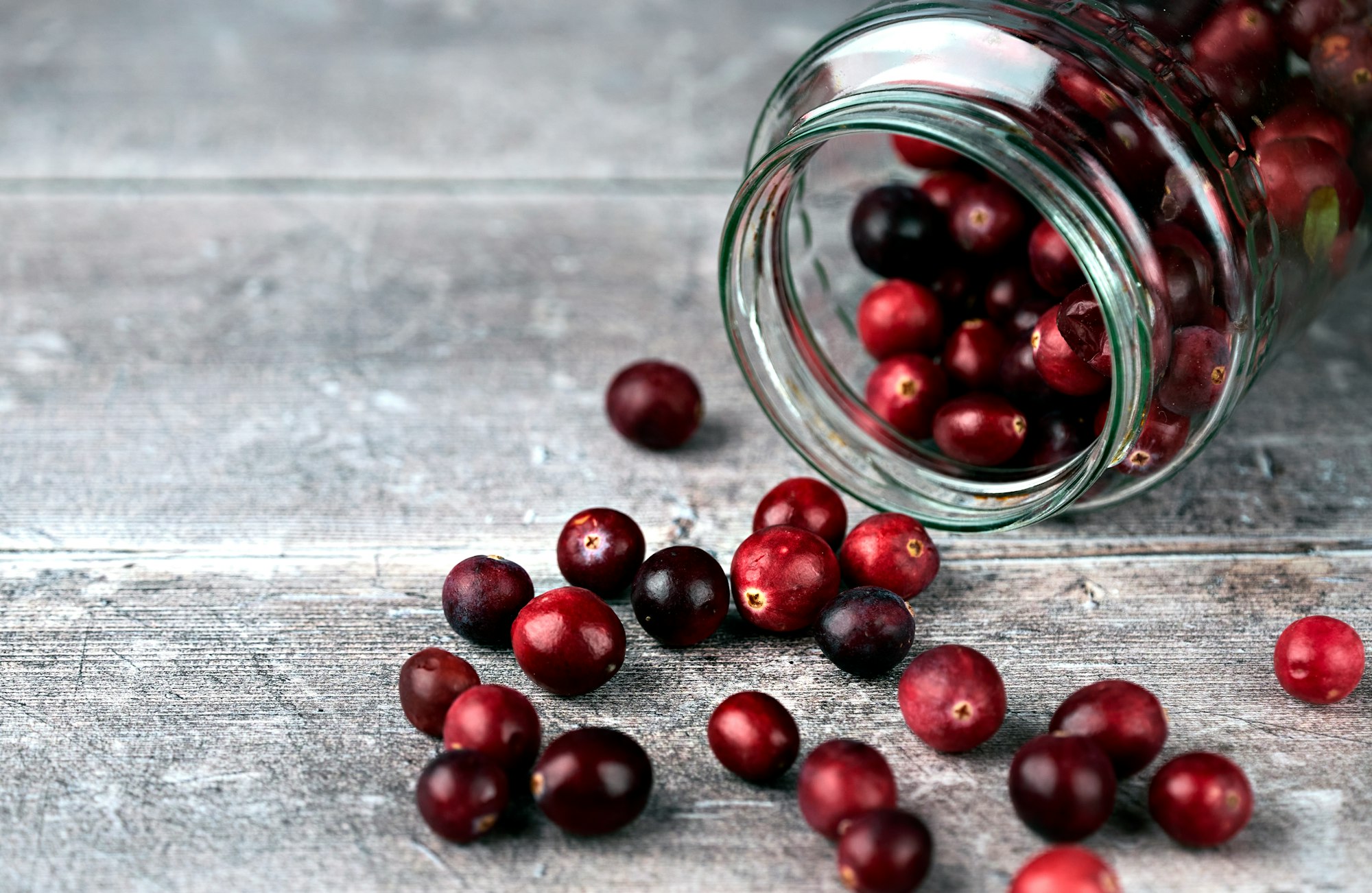There's nothing like enjoying a tangy cranberry sauce with your turkey during the holidays, but as you savor each bite, you might wonder, "Can dogs eat cranberries?" As our furry friends gaze at us with those irresistible puppy eyes, many of us have pondered this question. Let's dive into the world of cranberries and discover their effects on our canine companions.

Cranberries: A Brief Introduction
Before we jump into their impact on dogs, it's essential to understand what cranberries are all about. These small, red berries are native to North America and have been celebrated for their myriad health benefits. From potentially warding off urinary tract infections in humans to being a rich source of antioxidants, cranberries have made quite a name for themselves in the health sphere.
The Canine-Cranberry Connection
So, where do dogs fit into the cranberry narrative? It's not like our four-legged buddies are prone to sipping on cranberry juice or indulging in festive feasts, but should they?
Are Cranberries Safe for Dogs?
In short, yes. Cranberries, in their natural form, are safe for dogs to consume. However, it's crucial to differentiate between natural and commercial cranberry products, like juices and sauces. Many of these products contain added sugars, preservatives, or other ingredients that can harm dogs. So, if you're considering giving cranberries to your puppy, always opt for fresh or dried cranberries without any additives.
Health Benefits of Cranberries for Dogs
Cranberries aren't just a tangy treat; they come packed with health benefits for dogs. Some of the notable advantages include:
- Rich in Antioxidants: Cranberries are a fantastic source of antioxidants, which can help combat free radicals in a dog's body. This can promote overall health and reduce the risk of chronic diseases.
- Urinary Health: Just as cranberries are often recommended for human urinary health, there's some evidence to suggest they might benefit dogs in the same way. The compounds in cranberries can prevent harmful bacteria from adhering to the walls of the urinary tract, potentially reducing the risk of infections.
- Dental Health: Some studies have indicated that cranberry extract might help prevent the buildup of plaque on teeth. While it's no substitute for regular dental care, incorporating cranberries might offer some additional dental protection for our furry friends.
Potential Concerns with Cranberries
Like all foods, moderation is key. While cranberries offer multiple health benefits:
- Digestive Upsets: Overfeeding cranberries can lead to digestive disturbances in dogs, such as diarrhea or stomach upset. Always introduce them slowly and in moderation.
- Oxalate Content: Cranberries contain oxalates, which can contribute to the formation of kidney stones in dogs predisposed to this condition. If your dog has a history of kidney issues, it's essential to consult with a veterinarian before introducing cranberries to their diet.
Serving Cranberries: Tips and Tricks
If you've decided to offer cranberries to your canine companion, here are some handy tips to ensure a smooth and beneficial experience:
- Go Natural: As mentioned earlier, always offer fresh or dried cranberries without additives. Steer clear of cranberry sauces and commercially prepared cranberry products.
- Start Small: Introduce cranberries in small amounts to gauge your dog's reaction, both in terms of preference and potential digestive reactions.
- Get Creative: Consider blending cranberries into homemade dog treats or mixing them with other dog-friendly fruits like blueberries for a health-boosting snack.
Debunking Myths Around Canine Diets
It's not uncommon to encounter various myths when exploring new food options for dogs. One of the prevalent myths is that dogs are strict carnivores. In reality, dogs are omnivores and can benefit from a varied diet that includes fruits, vegetables, and other non-meat items. Cranberries are just one of the many potential additions to a balanced canine diet, offering unique benefits and flavors.
The Bigger Picture: Holistic Canine Health
While diet is undeniably a critical pillar of dog health, it's essential to view it as part of a broader health strategy. Regular exercise, mental stimulation, routine vet checks, and of course, a lot of love, all play their roles in ensuring our dogs live long, happy lives. So, as we explore the benefits of foods like cranberries, let's always remember the bigger picture and strive for a holistic approach to our pets' well-being.

Delving Deeper: What About Cranberry Supplements for Dogs?
The popularity of cranberries for canine health has led to a surge in cranberry-based supplements for dogs. From chewable tablets to powders, the market is flooded with options claiming to bolster urinary health, especially. But is this the right route for your pet?
Navigating the World of Supplements
Just as with human supplements, not all canine cranberry supplements are created equal. It's essential to:
- Check for Authenticity: Ensure the product genuinely contains cranberry extract. Some products might be misleading, offering minimal active ingredients and filled with unnecessary fillers.
- Consult a Veterinarian: Before adding any supplement to your dog's regimen, always consult with a vet. They can provide guidance on the appropriateness, dosage, and frequency.
- Monitor for Side Effects: As with introducing cranberries in their natural form, keep an eye out for any adverse reactions when starting a supplement. If you notice any changes in behavior, appetite, or health, it might be time to re-evaluate.
Cranberries vs. Other Berries: A Comparative View
Cranberries aren't the only berry on the block when it comes to dog-friendly fruits. How do they stack up against others?
- Blueberries: Like cranberries, blueberries are antioxidant powerhouses. They're also rich in vitamins and are a wonderful treat for dogs. While cranberries offer urinary health benefits, blueberries promote overall health and wellness.
- Strawberries: These juicy berries are safe for dogs and come packed with fiber, vitamins, and enzymes that can aid in digestion. However, they lack the urinary benefits that cranberries provide.
- Raspberries: These are a rich source of dietary fiber, antioxidants, potassium, manganese, copper, iron, and magnesium. However, they contain small amounts of xylitol, so they should be given in moderation.
Remember, variety is the spice of life. By offering different berries occasionally, you can give your dog a range of nutrients and flavors.
The Social Aspect: Dogs, Cranberries, and Bonding
While nutrition is paramount, let's not overlook the social component of introducing new foods like cranberries to our dogs. Sharing safe foods with our pets can foster deeper connections and bonding moments.
Making Cranberry Treats: A Fun Activity
Preparing homemade dog treats with cranberries can be an enjoyable activity for both pet and owner. Whether you're blending cranberries into a dog biscuit mix or creating a cranberry-infused frozen delight for those warmer days, the process can be as rewarding as the result. Watching your dog's eager anticipation and eventual enjoyment can bring immense joy to any pet owner.
Teaching Moderation and Obedience
Using cranberries as occasional treats can also be an opportunity to reinforce training. Teaching your dog to wait patiently or perform a trick before receiving their cranberry treat can instill discipline and patience, all while rewarding them for their good behavior.

Environmental Considerations: Sustainable Choices
As conscious consumers, it's essential to consider the environmental impact of our choices. When sourcing cranberries for your dog:
- Opt for Organic: If possible, choose organic cranberries. They're free from harmful pesticides and chemicals, ensuring that your dog gets the purest form of the fruit.
- Local is Lovable: Purchasing locally-sourced cranberries can reduce the carbon footprint associated with transporting the fruit. Plus, supporting local farmers strengthens community bonds.
Embracing a Holistic Lifestyle for Our Canine Companions
Incorporating cranberries into our dogs' diets signifies a broader trend — embracing a more holistic and natural lifestyle for our pets. Beyond just nutrition, it's about ensuring mental, emotional, and physical well-being. Activities like nature walks, interactive play, and even simple moments of affection contribute to this holistic view.
Beyond Nutrition: The Emotional Ties of Feeding
When we consider feeding our pets, we often limit our thinking to the nutritional benefits or potential hazards. However, there's an emotional and psychological aspect to it that we sometimes overlook.
Trust in Every Bite
Each time we offer a new food to our dogs, especially one that we've taken the time to research, like cranberries, we're building trust. They rely on us to give them food that's both tasty and safe. When we do our due diligence and provide them with treats that are beneficial and free from harm, we strengthen the bond of trust.
Observing and Learning: The Joy of Discovery
Watching our dogs try a new food is akin to witnessing a child's sense of wonder. Their initial hesitation, the cautious first sniff, followed by that tentative lick or bite—it's a journey of discovery for them and a joy for us to observe. As they learn to appreciate new flavors and textures, we get to learn more about their preferences and quirks.
The Larger Canine Palette: What Else is on the Menu?
While we've delved deep into the world of cranberries, it's just one among various fruits and vegetables dogs can safely enjoy. Expanding their diet can be an ongoing adventure:
- Pumpkin: This is a fantastic source of fiber, beneficial for digestion. Many dog owners have used pumpkin to soothe upset tummies.
- Carrots: Crunchy and packed with beta-carotene, they're excellent for dental health and vision.
- Green beans: Low in calories and high in beneficial nutrients, they can be a great treat for dogs, especially those watching their weight.
It's always a balance, of course. Just as with cranberries, introducing any new food should be done gradually and with close observation.
Reflecting on Responsibility: The Weight of Care
As pet owners, the well-being of our furry companions rests on our shoulders. Every food choice, every treat offered, and every dietary decision comes with a weight of responsibility. While the journey of exploring foods like cranberries can be exciting and rewarding, it's also a testament to the lengths we go to ensure our pets' happiness and health.
In the grand tapestry of pet care, nutrition is but one thread—albeit a crucial one. As we weave the narrative of our pets' lives, let's ensure that each thread, from food to play, from health checks to cuddles, is chosen with care, love, and the depth of responsibility we feel for these beloved members of our family.
And so, as the sun sets on our cranberry exploration, let's raise a toast (or a treat!) to the continued adventures, learnings, and joys of pet ownership. The journey, with its myriad flavors and experiences, is as delightful as a bowl of fresh, tangy cranberries—and that's saying something!
Conclusion
In exploring the question, "Can dogs eat cranberries?", we've journeyed through the health benefits, potential concerns, and even the broader emotional ties of feeding. Cranberries, rich in antioxidants and urinary health benefits, can indeed be a safe treat for dogs when offered in moderation. However, like all foods, it's vital to observe your pet for any adverse reactions and always prioritize their overall diet's balance.
The exploration transcended mere nutrition, touching upon the trust-building process with every bite and the broader canvas of canine nutrition. As pet owners, our choices reflect our love, commitment, and unwavering responsibility towards our furry companions.
Frequently Asked Questions (FAQs)
1. Can dogs eat cranberries safely?
Yes, dogs can eat cranberries in moderation. They're packed with antioxidants and offer urinary health benefits. However, always introduce them gradually and observe your dog for any adverse reactions.
2. How do cranberries benefit my dog's health?
Cranberries are rich in antioxidants, vitamin C, and fiber. They can promote urinary health by preventing bacteria from adhering to the bladder walls and potentially reducing the risk of urinary tract infections.
3. Are dried cranberries okay for dogs?
While dried cranberries aren't toxic, they often contain added sugars or other preservatives, which aren't ideal for dogs. If offering dried cranberries, ensure they're free from additives and give them sparingly.
4. Can I give my dog cranberry juice?
It's best to avoid commercial cranberry juices as they typically contain added sugars and other ingredients not suitable for dogs. If considering cranberry juice, ensure it's natural, unsweetened, and given in small quantities.
5. Are there any side effects of dogs eating cranberries?
While cranberries are generally safe, some dogs might have stomach upset or diarrhea if they consume too many. Always introduce them slowly and monitor your dog after feeding.
6. How should I introduce cranberries to my dog's diet?
Start by offering a small amount of mashed or chopped fresh cranberries mixed into their regular food. Monitor for any digestive or allergic reactions.
7. Can I use cranberries as a preventive measure for urinary issues in dogs?
While cranberries can help in preventing bacterial adherence in the urinary tract, it's essential to consult with a veterinarian before using them as a preventive measure.
8. How do cranberries compare to other berries for dogs?
Cranberries offer unique urinary health benefits, while other berries, like blueberries, provide general antioxidant benefits. It's great to offer a variety of safe berries for a range of nutrients.
9. Are cranberry supplements safe for dogs?
Many cranberry supplements are available for dogs, especially for urinary health. However, always consult a veterinarian before introducing any supplement to your dog's regimen.
10. How often can I give my dog cranberries?
Cranberries should be treated as an occasional treat rather than a regular diet component. Depending on your dog's size and dietary needs, a few cranberries a couple of times a week should suffice.

